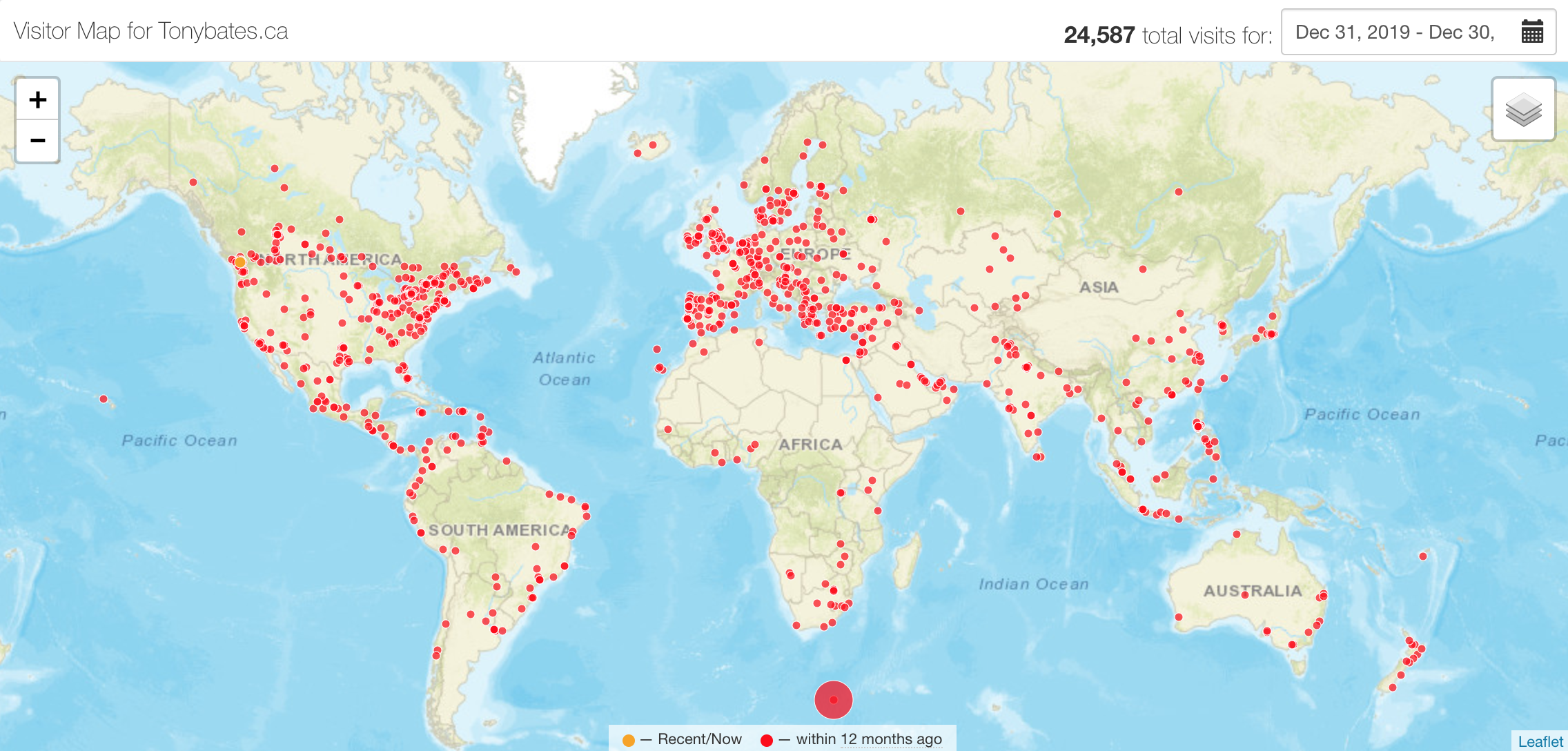
Each year I like to do a sort of annual report, for my own benefit. (My review of 2020 is in another post). My intention was to stop work entirely in 2020. I was doing so well. My son visited from England in January, no work, and a lovely vacation in Mexico in February, then all hell broke out in March.
Here’s the tally to date for 2020.
Contracts
- Aalborg University School of Business, Denmark
- BCIT, Burnaby
- Campus Support, Vancouver
- Contact North, Ontario
- Ryerson University, Ontario
Canadian Digital Learning Research Association
Board meetings: 7
I continued as the Board Chair during 2020. The CDLRA continues to struggle along with barely sufficient funding, carried by the hard work of its Executive Director, Research Officer and Jeff Seaman of Bayview Analytics, with funding mainly from eCampus Ontario.
CDLRA also had to pivot, away from its annual national survey in April, to a series of shorter, ‘quick-and-dirty’ Pulse studies on the response to Covid-19. It intends to renew the national survey in April 2021, but it urgently needs additional sources of funding if it is to meet the demands of tracking the volatile development of online and digital learning in Canada.
Virtual keynotes/webinars
26, to the following countries/regions:
- Asia-Pacific (Forestry Association)
- Athabasca Univ Ph.D. students
- Agency for Innovation and Professional Development, Belarus and Kazakhstan
- Colleges and Institutes Canada
- Contact North (Canada)
- European Distance Education Network (x2)
- European Foundation for Management Development.
- University of the Aegean, Greece
- Gulf Arab States Educational Research Group
- ICERI2020 (International Academy of Technology, Education, and Development)
- Gasta, Ireland
- Justice Institute of British Columbia
- University of Kent Business School
- Centre for Quality Assessment in Higher Education, Lithuania
- McMaster Univ.: Education and Cognition
- Nigerian Association for Technology Innovation and Integration in Education
- Penn State University American Centre for Research in Distance Education
- Philippine Association of Colleges and Universities
- Lady of Fatima University, Philippines
- Royal Roads University: Master of Arts in Learning and Technology graduate students
- United Arab Emirates University
- Université du Québec en Abitibi-Témiscamingue
- University of Pretoria, South Africa
- University of South Africa.
- WCET, USA
Just think of all the carbon credits I’ve earned by not flying to these conferences!
I also did several press interviews, and interviews for podcasts, one for the Indira Gandhi National Open University, and one for New Language Solutions.
But this has to stop. From next year, working in collaboration with Commonwealth of Learning, I will be offering free, pre-recorded keynotes that can be downloaded and played into a virtual conference for those that want to do that.
I will provide more information on this in my blog in the early New Year, but I don’t intend to go on doing live virtual conference presentations. I cannot go on disrupting my sleep patterns to meet conference schedules in other parts of the world, and there is no real difference between my doing it live and the streamed version. The follow-up Q&A can be handled separately through email.
My web site
This has been one of the busiest years ever on my web site. Since 2008, when it was first launched, the site has been viewed a total of 3.4 million times. This year it has been viewed just over 400,000 times, or roughly 1,100 times a day on average.
This is as high as any other previous year. One post alone, Advice to those about to teach online because of the coronavirus, posted on March 9, has been viewed over 60,000 times already this year, including 8,518 times on March 11, which had the highest one-day traffic ever on the site, 9,720 views. I realise this is not in Taylor Swift or Alicia Keys territory, but it does indicate what an extraordinary year this has been for online learning.
I ended up doing 74 posts over the last 12 months, close to the overall yearly average, but considerably more than the 43 last year.
What I found interesting is that apart from the advice on how to teach online, the most popular posts in 2020 were posted prior to 2020. This suggests that these posts are set readings on a number of different courses, and continue to be popular over the years. I am pleased about this, as this site is meant to be used as a resource on online and distance learning.
The most popular posts in 2020 were as follows:
The three most popular posts in 2020 besides ‘Advice to those about to teach online’ were:
| What have we learned from Covid-19 about the limitations of online learning – and the implications for the fall?? | 2,627 |
| Research reports on Covid-19 and emergency remote learning/online learning | 2,442 |
| Online learning and the fall semester: advice for decision-makers | 2,335 |
Next year
Who knows? I will continue with some blog posts. I have a number of research reports and research studies that I would like to review, and a couple of contracts to complete, but I will probably not take on any more paid work after that. But never say never!









 Dr. Tony Bates is the author of eleven books in the field of online learning and distance education. He has provided consulting services specializing in training in the planning and management of online learning and distance education, working with over 40 organizations in 25 countries. Tony is a Research Associate with Contact North | Contact Nord, Ontario’s Distance Education & Training Network.
Dr. Tony Bates is the author of eleven books in the field of online learning and distance education. He has provided consulting services specializing in training in the planning and management of online learning and distance education, working with over 40 organizations in 25 countries. Tony is a Research Associate with Contact North | Contact Nord, Ontario’s Distance Education & Training Network.


From Maxim Jean-Louis, President, Contact North
THANK GOODNESS TONY BATES HAS FAILED AT RETIREMENT YET AGAIN IN 2020!
Mark Nicholas of the Open Polytechnic of New Zealand has an interesting podcast series – The Leaders and Legends of Online Learning. Fittingly, Tony Bates was the first person interviewed.
A legend because he has made a difference to thousands of instructors over his long career as a researcher, practitioner, teacher and writer. His books – there are twelve of them – have provided insights, practical advice and supports for many who embarked on the journey from a classroom to online teaching and learning. In particular, his book Teaching in a Digital Age ( the No. 1 book on online learning – in terms of demand)
and its successor The Ten Fundamentals of Teaching Online for Faculty and Instructors have inspired and informed a great many who are now shaping what online learning could become.
His blog
His blog (one of the most read in the online learning world) is viewed by over a thousand individuals each day – people looking for information, data, inspiration, help. Since he began blogging in 2008, the site has secured over 3.4 million visits – something many offering similar services would be envious of.
Tony began his work in distance education at The Open University in the UK in 1969, having previously taught in elementary and secondary schools in England. He joined the Open Learning Agency in Canada in 1990 and later took up a position at the University of British Columbia as Director of Distance education and Technology in Continuing Studies in 1995, retiring in 2003. He hasn’t stopped teaching, researching or writing since.
His key contribution is his relentless focus on what learners need to be able to learn and what faculty need to do to enable that learning. His dry sense of humour coupled with his commitment to evidence-based design is evident in his webinars, blog posts, books and presentations. His care and concern for the genuineness and warmth of teaching is evident in his own approach to his craft – he shows empathy and compassion in his work and interaction with others.
He is also very committed to gathering pertinent evidence about online and digital learning. He is one of the founders of an organization called The Canadian Digital Learning Research Association which seeks to measure the evolution of digital learning at publicly funded post-secondary institutions in Canada and to assess its impact on employment, skills development and digital competencies across the country. They have produced annual “state of the nation” reports as well as snapshots of specific developments .
Tony has made so many contributions to all of our work since the 1970’s that it is difficult to isolate key “nuggets” from his substantial body of work. But five stand out as worthy of our attention as we begin a new year:
1. Good teaching may overcome a poor choice of technology, but technology will never save bad teaching. Tony’s life-long focus has been on enabling effective teaching to become excellent, no matter what the medium of learning is. Whether it is television, radio, print, online, blended or in-person – the challenge is to engage learners in meaningful and authentic work from which they both grow and learn. In his early days at the Open University and later at the Open Learning Agency (pre-internet), he looked at the design of learning in different media and what the strengths and limits of these media were. Tony “gets” that technology is an enabler, but he also “gets” that it is the teacher’s presence and their engagement with learners and content that makes a difference.
2. Deliberate design matters. While some aspects of teaching benefit from improvisation, in an online and distance teaching work deliberate, focused design and the thoughtful anticipation of how different learners will experience the same task, challenge, resource or activity is key to the work we do. Like many others engaged in this work, Tony also wants to look at what students actually do with our designs so that we can tweak, change, improve. If the evidence points to it, we also need to throw out those design elements that do not work. He discovered what many of us took a long time to find out: good teaching and learning online is about the experience of learning, not content.
3. Different kinds of learners need different approaches for their learning experience. Tony taught classes of 40+ children aged seven to nine in a rural school in England and then students with special needs in a comprehensive school in Birmingham in the late 1960’s. A rich learning ground, especially for a young teacher, he quickly discovered that one size and one learning design does not suit all. Adaptive learning routes, multi-media resources, small group work, some 1:1 teaching may all be components needed to meet the varied needs of the very different students in a course. Making sure that the related student support services are part of the faculty members’ armoury of resources is also a component of the design of supportive services which need to be in the mind of faculty as they work with students.
4. Faculty need to learn and need support. Throughout his career as a researcher and administrator, Tony has helped faculty think about, explore and work on the design, development and delivery of online and blended learning. All professionals need continuing professional development to keep their skills and understanding up to date. Yet so many who teach in our universities or colleges have not received any formal training in teaching or online learning design: they need this learning, as we saw during the pivot to remote learning. They also need ongoing support to help them both understand and use emerging technologies.
5. Don’t forget the management and administrative challenges of online and flexible learning. Tony’s doctorate is in educational administration (from the Institute of Education, University of London) and he spent many years managing major projects. It is therefore not surprising that he keeps drawing our attention to the management and logistics involved in enabling online and distance learning, especially at scale. The need for strategic foresight and planning, flexibility and responsiveness, adequate resources and effective management of logistics is something Tony stresses in many of his books, webinars and presentations. In this, as in all of his observations, he encourages those of us who have to make managerial and administrative decisions to use evidence and data in doing so. Resilience, he observes, comes from adaptability within the eco-system of trust.
Five honorary degrees from universities in four countries (two from Canada – Laurentian and Athabasca) and a Medal of Merit from University of Veracruzana, Xalapa, Mexico tell us just how respected Tony is around the world. We are grateful that Tony remains a Research Associate with Contact North| Contact Nord and we look forward to many more years of failed retirement. We are also grateful to his wife, Pat, a scholar in her own right, who so generously lets all of us borrow Tony so often.
Tony also loves cooking and golf, and is a (definitely retired) private pilot who has flown across Canada and back in a small plane.
Maxim Jean-Louis
Contact North I Contact Nord
Ontario, Canada
P.S. Like many of us around the world, I see Tony as a colleague, a mentor, and a friend. I will not indicate for how many decades so I do not age myself!
Thanks, Maxim – I really appreciate the praise, but online learning and distance education have given me a wonderful lifetime of experience. The best advice I ever had was: find out what you love doing, and get someone else to pay you for it. Certainly worked for me.